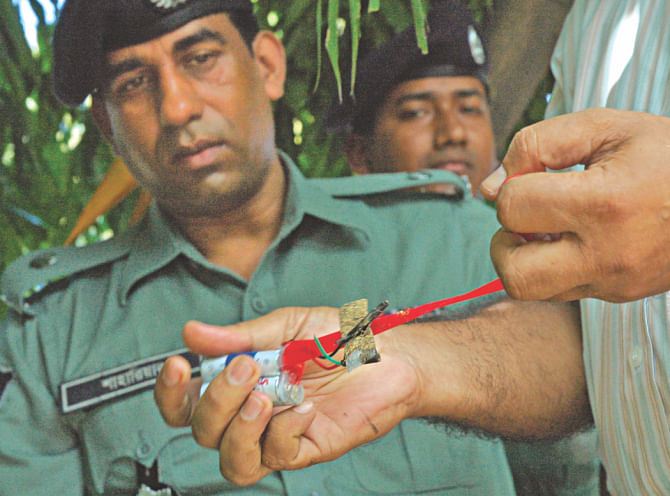In prison, still ominous

Jama'tul Mujahideen Bangladesh (JMB), the banned Islamist outfit that carried out countrywide bomb attacks nine years ago, still poses the threat of terror attacks.
The government's flagging socio-political campaign against militancy and slackness in monitoring JMB activities since 2012 has given the outfit space to regroup, believe many officials of intelligence agencies.
Hundreds of JMB operatives were arrested after the bomb attacks left one dead and more than a hundred others wounded in 63 districts on August 17, 2005.
According to official statistics, 478 JMB men have been tried in 177 cases between 2007 and 2014. Of them, 51 top leaders of the outfit have been sentenced to death, 178 given life terms and 245 jailed for various terms.
Around 250 more, accused in the cases, remain out of the police dragnet.
Many others, arrested in the cases, slipped through legal loopholes and rejoined the militant outfit, only to increase the threat of terror attacks, said officials, referring to the February 23 attack on a prison van carrying three high-profile JMB leaders from a Gazipur jail to a Mymensingh court.
They are Rakib Hasan Russell alias Hafez Mahmud, Salauddin Ahmed alias Salehin and Zahidul Islam alias "Boma" Mizan.
Hafez was later killed in a police shootout while in custody. But Salehin, in-charge of the JMB in Sylhet and Mymensingh, and Mizan, an explosives expert, are still at large, causing a massive headache for law enforcers.
Against this backdrop, the government has decided to strengthen its monitoring on militant outfits. It is also looking for a way to expedite the process of executing 54 militants who are on death row.
They have been sentenced to death in different cases. But they are yet to be executed as they face several more cases.
Wishing anonymity, a senior police official said, “Execution of the condemned militants has become essential as transporting them from jails to courts for hearing in the cases is very risky.”
The militants get the chance to meet one another in the courts and discuss the activities of their organisations. “They can influence others,” said the official.
Moreover, no step has been taken to motivate and correct the detained militants. As a result, a significant number of JMB activists have re-engaged themselves in militant activities after getting out of jail.
Inspector General of Prisons Brig Gen Syed Iftekhar Uddin said there were no such arrangements in prison.
According to Joint Commissioner (detective branch) of Dhaka Metropolitan Police Monirul Islam, militancy is a doctrine, and it is not possible to root it out only by enforcing law.
“Militants keep faith in a distorted explanation of the Quran and the Hadith. Islamic scholars should come forward to motivate them through the right explanations of the Quran and Hadith,” he told reporters at his office recently.
Talking to The Daily Star last night, State Minister for Home Asaduzzaman Khan said monitoring on all militant outfits has been stepped up.
“We are keeping track of those coming out of jails. In many cases, they are arrested so that they cannot rejoin their outfits,” he said.
In the name of establishing Sharia (Islamic law), the JMB started operating in Rajshahi, Natore and Naogaon in 2004 when the BNP-led four-party alliance government was in power.
Aided and abetted by some ministers, lawmakers, four-party alliance leaders, and members in local administration and police, militant vigilantes of the JMB terrorised people in the name of ridding the northern districts of outlawed Sarbahara and Purbo Banglar Communist Party. They killed at least 22 people and injured scores during that time.
The militant outfit managed to establish a strong network and carried out the countrywide bomb attacks. The network was dismantled following the arrest of its leaders and busting of dens across the country.
JMB chief Shaikh Abdur Rahman, its operations commander Bangla Bhai and four other top leaders were executed in 2007.
Identifying militancy as a social problem, the Awami League government in its previous term had launched socio-political and religious campaigns against militancy in 2009.
It believed the menace of militancy could not be uprooted with force only and such campaigns would be more effective to that end.
The National Committee on Militancy Resistance and Prevention, headed by the state minister for home, was formed to spearhead the campaign.
The committee came up with some innovative ideas such as training imams to give sermons before Juma prayers for creating public awareness about the evils of militancy.
The Islamic Foundation trained imams but there was no system to monitor whether it was doing the task accordingly.
Besides, anti-militancy short films, advertisements and documentaries have not been screened regularly at educational institutions and public places for lack of political will.
The education ministry was asked to organise discussions on the impact of terrorism and militancy in all educational institutions. Initially, there had been some initiatives but those didn't continue.
The ministry was also supposed to ensure that teachers delivered anti-militancy speeches at school assemblies. But it did not monitor whether the schools were indeed doing that.
The result was that the campaign lost momentum in 2011. After that, the law enforcement and intelligence agencies got busy tackling political violence, allowing the militant outfits to regroup.
Asaduzzaman said the committee was working on ways to stop terror financing and make people aware about the evils of militancy.

 For all latest news, follow The Daily Star's Google News channel.
For all latest news, follow The Daily Star's Google News channel. 




Comments